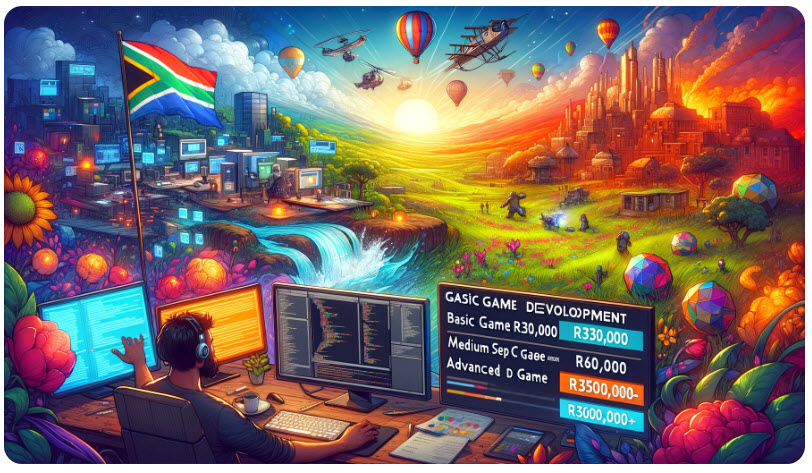The Cost of Game Development in South Africa: Understanding Pricing Tiers with the Unity Game Engine
Game development is a dynamic and engaging field, offering endless opportunities for creativity and innovation. In South Africa, this industry is growing, fueled by a mix of talented developers and the increasing accessibility of powerful development tools like the Unity game engine. However, the cost of developing a game can vary widely based on the complexity and scope of the project. In this blog post, we’ll explore the costs associated with three pricing tiers for Unity game development: Basic Game (R30,000), Medium Spec Game (R60,000), and Advanced Game (R150,000+), highlighting the various aspects and time-consuming nature of the process.
Basic Game Development: R30,000
A basic game typically involves simple mechanics and minimalistic design. This tier is perfect for small indie projects, mobile games, or prototypes. Here’s what you can expect within this budget:
- Concept and Design:
- Initial concept and design can take anywhere from 1 to 2 weeks.
- Simple game mechanics and straightforward user interfaces are developed.
- Art and sound assets are either minimal or sourced from existing libraries.
- Development:
- Basic coding for game mechanics and controls.
- Integration of simple 2D or low-poly 3D assets.
- Basic user interface (UI) and user experience (UX) design.
- Testing and debugging, which can take another 1 to 2 weeks.
- Deployment:
- Packaging the game for various platforms like Android, iOS, or PC.
- Basic marketing materials and app store submission.
Medium Spec Game Development: R60,000
A medium spec game involves more complex mechanics, better graphics, and more engaging content. This tier is suitable for more ambitious indie projects or small studio games. Here’s what’s involved:
- Concept and Design:
- Detailed game design document (GDD) which can take 2 to 4 weeks.
- More complex game mechanics and interactive elements.
- Custom art and sound assets designed specifically for the game.
- Development:
- Advanced coding for more sophisticated game mechanics.
- Integration of higher quality 2D or 3D assets.
- Enhanced UI/UX design with more interactive elements.
- Multiplayer functionality or more complex AI if required.
- Extensive testing and debugging, spanning 2 to 4 weeks.
- Deployment:
- Optimizing the game for multiple platforms, including console support.
- Comprehensive marketing strategy, including social media promotion and possibly a small launch event.
- Regular updates and maintenance post-launch.
Advanced Game Development: R150,000+
An advanced game involves top-tier graphics, complex mechanics, and extensive content. This tier is ideal for large-scale indie projects or studio-level games. Here’s a breakdown of the process:
- Concept and Design:
- Extensive GDD and pre-production planning, taking 4 to 8 weeks.
- Highly detailed and immersive game world with complex narratives.
- High-quality custom art and sound assets, possibly involving professional voice actors and musicians.
- Development:
- Sophisticated coding for advanced mechanics, including realistic physics and high-end graphics.
- Integration of high-fidelity 3D assets and animations.
- Comprehensive UI/UX design with intricate interfaces and user feedback systems.
- Multiplayer support with dedicated servers if required.
- Extensive testing, including beta testing phases, spanning several months.
- Deployment:
- Cross-platform optimization for PC, consoles, and mobile devices.
- Robust marketing campaign, potentially involving trailers, demos, and influencer partnerships.
- Continuous post-launch support and updates, with a dedicated team for maintenance and new content.
The Time-Consuming Nature of Unity Game Development
Regardless of the budget, game development is inherently time-consuming. Each stage of development requires meticulous attention to detail and a significant time investment:
- Pre-production: Involves brainstorming, planning, and creating initial designs. This stage can take weeks or even months, depending on the complexity of the game.
- Production: The actual development phase, including coding, asset creation, and integration, often takes several months. This phase requires constant testing and iteration to ensure the game functions as intended.
- Post-production: Involves polishing the game, fixing bugs, and preparing for launch. Post-launch, developers often need to provide updates and support, which continues to consume time and resources.
Conclusion
Developing a game with the Unity game engine in South Africa can vary greatly in cost and complexity. Whether you’re working on a basic game for R30,000, a medium spec game for R60,000, or an advanced game for R150,000+, understanding the various stages of development and the time commitment involved is crucial. Each project is a unique journey, requiring passion, dedication, and a significant investment of both time and money.
Get an App Development Quote
Complete this form with your app description for a free quote. You will also receive a signed NDA from us immediately.

